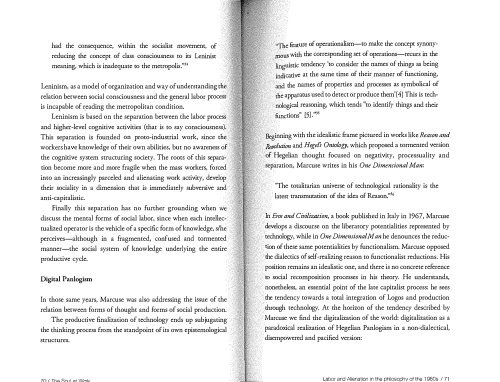Franco ''Bifo'' Berardi - The Soul at Work From Alienation to Autonomy
Franco ''Bifo'' Berardi - The Soul at Work From Alienation to Autonomy
Franco ''Bifo'' Berardi - The Soul at Work From Alienation to Autonomy
Create successful ePaper yourself
Turn your PDF publications into a flip-book with our unique Google optimized e-Paper software.
Labor and Alien<strong>at</strong>ion in the philosophy of the 1960s J 71<br />
had the consequence, within the socialist movement, of<br />
reducing the concept of class consciousness <strong>to</strong> its Leninist<br />
meaning, which is inadequ<strong>at</strong>e <strong>to</strong> the metropolis."34<br />
Leninism, as a model of organiz<strong>at</strong>ion and way of understanding the<br />
tel<strong>at</strong>ion between social consciousness and the general labot process<br />
is incapable of reading the metropolitan condition.<br />
Leninism is based on the sep<strong>at</strong><strong>at</strong>ion between the labor process<br />
and higher-level cognitive activities (th<strong>at</strong> is <strong>to</strong> say consciousness).<br />
This separ<strong>at</strong>ion is founded on pro<strong>to</strong>-industtial wotk, since the<br />
workers have knowledge of their own abilities, but no aw<strong>at</strong>eness of<br />
the cognitive system structuring society. <strong>The</strong> roots of this separ<strong>at</strong>ion<br />
become more and more fragile when the mass wotkets, forced<br />
in<strong>to</strong> an increasingly p<strong>at</strong>celed and alien<strong>at</strong>ing wotk activity, develop<br />
their sociality in a dimension th<strong>at</strong> is immedi<strong>at</strong>ely subversive and<br />
anti -capitalistic.<br />
Finally this sep<strong>at</strong><strong>at</strong>ion has no furthet grounding when we<br />
discuss the mental fotms of social labor, since when each intellectualized<br />
oper<strong>at</strong>or is the vehicle of a specific form of knowledge, slhe<br />
perceives-although in a fragmented, confused and <strong>to</strong>rmented<br />
manner-the social system of knowledge underlying the entite<br />
productive cycle.<br />
Digital Panlogism<br />
In those same years, Marcuse was also addressing the issue of the<br />
rel<strong>at</strong>ion between forms of thought and forms of social production.<br />
<strong>The</strong> productive finaliz<strong>at</strong>ion of technology ends up subjug<strong>at</strong>ing<br />
the thinking process from the standpoint of its own epistemological<br />
structures.<br />
"<strong>The</strong> fe<strong>at</strong>ure of oper<strong>at</strong>ionalism-<strong>to</strong> make the concept synonymOUS<br />
with the corresponding set of oper<strong>at</strong>ions-recurs in the<br />
linguistic tendency '<strong>to</strong> consider the names of rhings as being<br />
indic<strong>at</strong>ive <strong>at</strong> the same time of their manner of functioning,<br />
and the names of properties and processes as symbolical of<br />
the appar<strong>at</strong>us used <strong>to</strong> detect or produce them' [4] This is technological<br />
reasoning, which tends "<strong>to</strong> identify things and their<br />
functions)) (5) ."35<br />
Beginning with the idealistic frame pictured in works like Reason and<br />
Revolution and Hegels On<strong>to</strong>logy, which proposed a <strong>to</strong>tmented vetsion<br />
of Hegelian thought focused on neg<strong>at</strong>ivity, processuality and<br />
separ<strong>at</strong>ion, Marcuse writes in his One Dimensional Man:<br />
"<strong>The</strong> <strong>to</strong>talitarian universe of technological r<strong>at</strong>ionality is the<br />
l<strong>at</strong>est transmut<strong>at</strong>ion of the idea of Reason."36<br />
In Eros and CiviliZ4tion, a book published in Italy in 1967, Marcuse<br />
develops a discourse on the Iiber<strong>at</strong>oty potentialities represented by<br />
technology, while in One Dimensional Man he denounces the reduction<br />
of these same potentialities by functionalism. Marcuse opposed<br />
the dialectics of self-realizing reason <strong>to</strong> functionalist reductions. His<br />
position remains an idealistic one, and there is no concrete reference<br />
<strong>to</strong> social recomposition processes in his theory. He understands,<br />
nonetheless, an essential point of the l<strong>at</strong>e capitalist process: he sees<br />
the tendency <strong>to</strong>wards a <strong>to</strong>tal integr<strong>at</strong>ion of Logos and production<br />
through technology. At the horizon of the tendency described by<br />
Marcuse we find the digitaliz<strong>at</strong>ion of the world: digitaliz<strong>at</strong>ion as a<br />
paradoxical realiz<strong>at</strong>ion of Hegelian Panlogism in a non-dialectical,<br />
disempowered and pacified vetsion:




